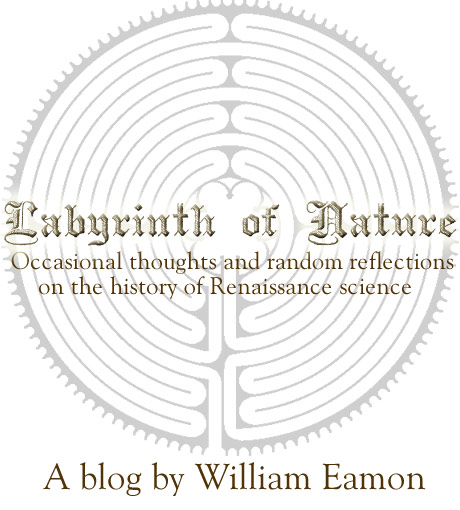THE RAVAGES OF WARFARE, PUBLIC VIOLENCE, AND DISFIGURING NEW DISEASES made the Renaissance an age of surgical innovation, and professor of secrets Leonardo Fioravanti was a witness to one of the most amazing innovations of all: Surgical reconstruction of the nose, known in medical terms as rhinoplasty . It’s a pretty amazing story in itself. Here’s what happened: Read more »
Advance Notices of “The Professor of Secrets”
It’s fun to read reviews of your books–provided they are favorable. Here’s the first advance review of The Professor of Secrets that I have seen. It’s by Nick Owchar of the Los Angeles Times:
William Eamon also brings a distant world up close in “The Professor of Secrets: Mystery, Medicine, and Alchemy in Renaissance Italy” (National Geographic: 320 pp., $26). Eamon traces the life of Leonardo Fioravanti, a 16th century doctor in Bologna, who challenged established medical methods with a bold new way to handle illness. There were many “professors of secrets” like Fioravanti, Eamon explains, and they were called by this title because of their practice of using syrups, oils and distilled drugs “made of herbal concoctions or mineral substances” to unlock nature’s secrets and battle plague, bladder stones and other ailments great and small. Fioravanti, however, is the focus of Eamon’s fine study, a cocky figure who once challenged the physicians of Milan to use their treatments on 25 patients while he would treat another group of 25: “If I don’t cure my patients quicker and better than they do theirs,” he declared, “I’m willing to be banished forever from this city.” (Eamon says it’s unlikely that the contest happened but that “the historical record is mute.”)
As Eamon shows, Fioravanti and other doctors like him — in combating superstition and ignorance — were seeking real medical breakthroughs that would reveal the “Magna Medicina” (“Great Medicine”). The author presents what medicine was like during the Renaissance with a wealth of unexpected details (one found, in a Renaissance pharmacy, “an alligator hanging from the ceiling” and “stuffed armadillos and miraculous healing stones”) and a light, accessible touch (a discussion of blood, yellow and black bile and phlegm is found in the section “Humor me”) that makes this book welcome reading not only for the summer but for any time of year.
(Read the complete review here.)
“With the Rules of Life and an Enema”: Alternative Medicine and the Way of Nature
Not so long ago, “alternative medicine”—a heterogeneous mélange of healing practices that includes everything from herbalism to acupuncture—was regarded as nothing more than a relic of medicine’s prescientific past or, worse, a cultish fad. That is hardly the case any longer. Each year, millions of Americans use some form of alternative medicine. In fact, according to a 2007 survey, 38 percent of American adults and approximately 12 percent of U.S. children use complementary and alternative medicine, or CAM. Read more »
Labyrinth of Nature
Albert Einstein famously told a story about how, when he was a child, his father showed him a compass. Looking at the strange instrument, the boy trembled and grew cold. At that moment, Einstein realized something that would propel him in all of his scientific endeavors: it was the realization that nature held secrets. In the wavering needle that somehow seemed “know” which way was north no matter where the compass was placed, Einstein found a metaphor of the scientist’s quest to understand and to penetrate nature’s mysteries.
The recognition that nature has secrets fascinated Einstein, as it has fascinated other scientists and will, no doubt, continue to fascinate budding scientists. The discovery of nature’s secrets may be the singular motive that drives science. Yet inquiry into the strange and mysterious has, historically, been problematic. Does nature have secrets? Why are the laws of nature hidden? Does nature play a game with us, as many Renaissance philosophers believed? Are those secrets divine, or dangerous? Can we legitimately know them?
The ancient philosopher Heraclitus wrote, “Nature loves to hide.” That sentiment led me to the title for this blog. In Labyrinth of Nature, I want to go deeper into that metaphor and to explore the motivations and the dreams that led Renaissance scientists to their original, and sometimes fanciful notions about the world. I hope you’ll join me in that exploration.
Coming Soon: “The Professor of Secrets”
I am pleased to announce the forthcoming publication of my new book, The Professor of Secrets. Set in sixteenth-century Italy, the book tells the story of Leonaro Fioravanti, who rose from obscurity to become the first “celebrity” doctor of the early modern age. A brilliant, forward-thinking, and utterly unconventional doctor, Fioravanti had a talent for self-aggrandizement and his self promotion earned him the adoration of the people, the derision of the medical establishment, and a reputation as one of his era’s most colorful and combative figures. The Professor of Secrets is a tale of Renaissance self-fashioning. The book involved years of research in the archives and libraries of Italy, Spain, and Europe. Scheduled for publication in July, The Professor of Secrets will be in bookstores on July 20 and is available for preorder from Amazon.com now. I hope you enjoy it. I will be sending new posts about the book and my other projects from time to time, and I welcome your feedback.
